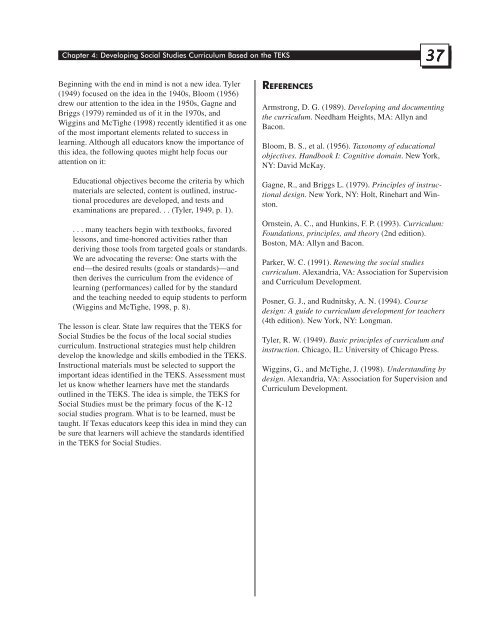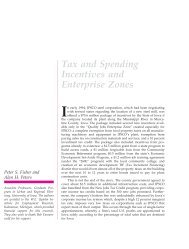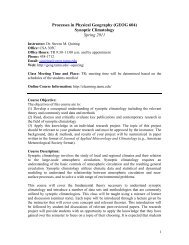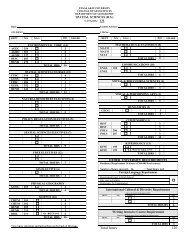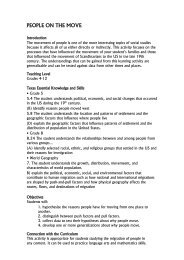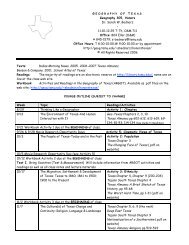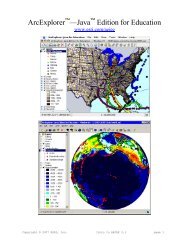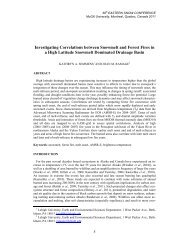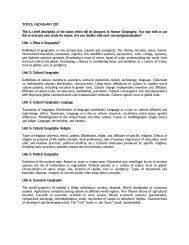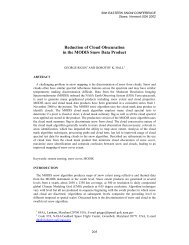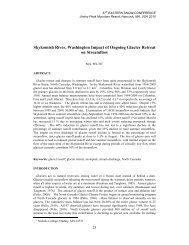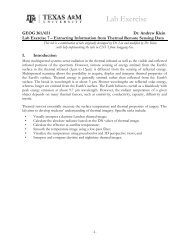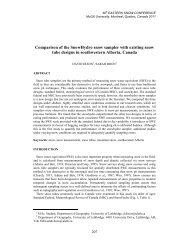Texas Social Studies Framework - Department of Geography ...
Texas Social Studies Framework - Department of Geography ...
Texas Social Studies Framework - Department of Geography ...
Create successful ePaper yourself
Turn your PDF publications into a flip-book with our unique Google optimized e-Paper software.
Chapter 4: Developing <strong>Social</strong> <strong>Studies</strong> Curriculum Based on the TEKS<br />
Beginning with the end in mind is not a new idea. Tyler<br />
(1949) focused on the idea in the 1940s, Bloom (1956)<br />
drew our attention to the idea in the 1950s, Gagne and<br />
Briggs (1979) reminded us <strong>of</strong> it in the 1970s, and<br />
Wiggins and McTighe (1998) recently identified it as one<br />
<strong>of</strong> the most important elements related to success in<br />
learning. Although all educators know the importance <strong>of</strong><br />
this idea, the following quotes might help focus our<br />
attention on it:<br />
Educational objectives become the criteria by which<br />
materials are selected, content is outlined, instructional<br />
procedures are developed, and tests and<br />
examinations are prepared. . . (Tyler, 1949, p. 1).<br />
. . . many teachers begin with textbooks, favored<br />
lessons, and time-honored activities rather than<br />
deriving those tools from targeted goals or standards.<br />
We are advocating the reverse: One starts with the<br />
end—the desired results (goals or standards)—and<br />
then derives the curriculum from the evidence <strong>of</strong><br />
learning (performances) called for by the standard<br />
and the teaching needed to equip students to perform<br />
(Wiggins and McTighe, 1998, p. 8).<br />
The lesson is clear. State law requires that the TEKS for<br />
<strong>Social</strong> <strong>Studies</strong> be the focus <strong>of</strong> the local social studies<br />
curriculum. Instructional strategies must help children<br />
develop the knowledge and skills embodied in the TEKS.<br />
Instructional materials must be selected to support the<br />
important ideas identified in the TEKS. Assessment must<br />
let us know whether learners have met the standards<br />
outlined in the TEKS. The idea is simple, the TEKS for<br />
<strong>Social</strong> <strong>Studies</strong> must be the primary focus <strong>of</strong> the K-12<br />
social studies program. What is to be learned, must be<br />
taught. If <strong>Texas</strong> educators keep this idea in mind they can<br />
be sure that learners will achieve the standards identified<br />
in the TEKS for <strong>Social</strong> <strong>Studies</strong>.<br />
REFERENCES<br />
37<br />
37<br />
Armstrong, D. G. (1989). Developing and documenting<br />
the curriculum. Needham Heights, MA: Allyn and<br />
Bacon.<br />
Bloom, B. S., et al. (1956). Taxonomy <strong>of</strong> educational<br />
objectives. Handbook I: Cognitive domain. New York,<br />
NY: David McKay.<br />
Gagne, R., and Briggs L. (1979). Principles <strong>of</strong> instructional<br />
design. New York, NY: Holt, Rinehart and Winston.<br />
Ornstein, A. C., and Hunkins, F. P. (1993). Curriculum:<br />
Foundations, principles, and theory (2nd edition).<br />
Boston, MA: Allyn and Bacon.<br />
Parker, W. C. (1991). Renewing the social studies<br />
curriculum. Alexandria, VA: Association for Supervision<br />
and Curriculum Development.<br />
Posner, G. J., and Rudnitsky, A. N. (1994). Course<br />
design: A guide to curriculum development for teachers<br />
(4th edition). New York, NY: Longman.<br />
Tyler, R. W. (1949). Basic principles <strong>of</strong> curriculum and<br />
instruction. Chicago, IL: University <strong>of</strong> Chicago Press.<br />
Wiggins, G., and McTighe, J. (1998). Understanding by<br />
design. Alexandria, VA: Association for Supervision and<br />
Curriculum Development.


